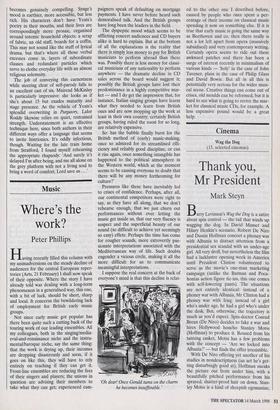Music
Where's the work?
Peter Phillips
Having recently filled this column with my animadversions on the steady decline of audiences for the central European reper- tories (Arts, 21 February) I shall now speak of their opposite. Where the story I have already told was dealing with a long-term phenomenon in a generalised way, this one, with a bit of luck, should be short, sharp and local. It concerns the bewildering lack of employment for British early music groups. Not since early music got popular has there been quite such a cutting back of the touring work of our leading ensembles. All my colleagues, both in the singing/media- eval-and-renaissance niche and the instru- mental/baroque niche, say the same thing: that the work is drying up, their incomes are dropping disastrously and soon, if it goes on like this, they will have to rely entirely on teaching if they can get it. Front-line ensembles are reducing the fees of their singers and players; the unions in question are advising their members to take what they can get; experienced cam- paigners speak of defaulting on mortgage payments. I have never before heard such demoralised talk. And the British groups have long been the leaders in the field.
The dyspeptic mood which seems to be afflicting concert audiences and CD buyers alike is hard to explain. But at the bottom of all the explanations is the reality that there is simply less money to pay for British musicians to perform abroad than there was. Possibly there is less money for classi- cal musicians of any nationality to perform anywhere — the dramatic decline in CD sales across the board would suggest it; possibly the British groups have lost their predominance in a highly competitive mar- ket — and I do get the impression that, for instance, Italian singing groups have learnt what they needed to learn from British ones and are now mopping up the work at least in their own country; certainly British groups, having ruled the roost for so long, are relatively expensive.
So: has the bubble finally burst for the British method of (early) music-making, once so admired for its streamlined effi- ciency and reliably good discipline, or can it rise again, once something intangible has happened to the political atmosphere in the Western world, which at the moment seems to be causing everyone to doubt that there will be any money forthcoming for culture?'
Pressures like these have inevitably led to crises of confidence. Perhaps, after all, our continental competitors were right to say, as they have all along, that we don't rehearse enough, that we just churn out performances without ever letting the music get inside us, that our very fluency is suspect and the superficial beauty of our sound (so difficult to achieve yet seemingly so easy) effete. Perhaps the time has come for rougher sounds, more extrovertly pas- sionate interpretations associated with the Mediterranean way of life. Such doubts engender a vicious circle, making it all the more difficult for us to communicate meaningful interpretations.
I suppose the real concern at the back of everyone's mind is that this decline is relat-
`Oh dear! Once Gerald turns on the charm he becomes insufferable.'
ed to the other one I described before, caused by people who once spent a per- centage of their income on classical music spending it now on something else. If it is true that early music is going the same way as Beethoven and co. then there really is not a lot left apart from opera (massively subsidised) and very contemporary writing. Certainly opera seems to ride out these awkward patches and there has been a surge of interest recently in minimalism of various kinds — 'holy' in the case of John Tavener, plain in the case of Philip Glass and David Bowie. But all in all this is potentially very serious for the wider musi- cal scene. Creative things can come out of crises, old moulds can be reformed, but it is hard to see what is going to revive the mar- ket for classical music CDs, for example. A less expensive pound would be a great help.


































































 Previous page
Previous page